初三英语总复习
- 格式:doc
- 大小:61.50 KB
- 文档页数:7

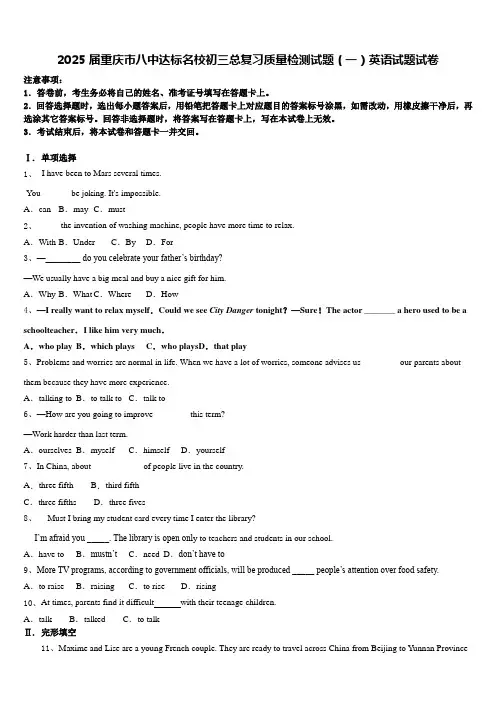
2025届重庆市八中达标名校初三总复习质量检测试题(一)英语试题试卷注意事项:1.答卷前,考生务必将自己的姓名、准考证号填写在答题卡上。
2.回答选择题时,选出每小题答案后,用铅笔把答题卡上对应题目的答案标号涂黑,如需改动,用橡皮擦干净后,再选涂其它答案标号。
回答非选择题时,将答案写在答题卡上,写在本试卷上无效。
3.考试结束后,将本试卷和答题卡一并交回。
Ⅰ. 单项选择1、- I have been to Mars several times.-You ______ be joking. It's impossible.A.can B.may C.must2、_____ the invention of washing machine, people have more time to relax.A.With B.Under C.By D.For3、—________ do you celebrate your father’s birthday?—We usually have a big meal and buy a nice gift for him.A.Why B.What C.Where D.How4、—I really want to relax myself.Could we see City Danger tonight?—Sure!The actor _______ a hero used to be a schoolteacher.I like him very much.A.who play B.which plays C.who plays D.that play5、Problems and worries are normal in life. When we have a lot of worries, someone advises us ________ our parents about them because they have more experience.A.talking to B.to talk to C.talk to6、—How are you going to improve ________this term?—Work harder than last term.A.ourselves B.myself C.himself D.yourself7、In China, about ___________ of people live in the country.A.three fifth B.third fifthC.three fifths D.three fives8、--- Must I bring my student card every time I enter the library?--- I’m afraid you _____. The library is open onl y to teachers and students in our school.A.have to B.mustn’t C.need D.don’t have to9、More TV programs, according to government officials, will be produced _____ people’s attention over food safety.A.to raise B.raising C.to rise D.rising10、At times, parents find it difficult with their teenage children.A.talk B.talked C.to talkⅡ. 完形填空on a tandem bicycle (双人自行车). They have two main purposes and one of them is that they want to encourage green 1 through it.Maxime, 26, works helping farmers raise their cows, 2 his wife Lise, 26, is a teacher. The two also like sharing their travel stories on Facebook.“We choose a tan dem bicycle because it makes it 3 to communicate with each other about interesting people and things we come across during the journey. 4 , bicycling is healthier. And it’s a cheaper and more environment-friendly way of traveling than 5 ca rs, motors and so on,” the couple said.As for the other 6 of their journey, the two said they wanted to get people’s good ideas on topics such as health,economy (经济) and politics. When they were asked 7 they chose to visit China, they said it was because they often talked about its long history and beauty and how much of the country is competitive (有竞争力的) in the world.“We know China is a country with a large population and will be the 8 of the economy around the world in the future. We want to get a better understanding of the country and its people. We 9 the country,” they said.The couple will be on their journey to China soon. We hope they can make more people further 10 China by sharing what they see and hear on the way. Meanwhile, we hope they enjoy their travel in China.1.A.food B.farming C.travel D.living2.A.while B.though C.because D.so3.A.busier B.easier C.earlier D.lazier4.A.Besides B.Instead C.However D.except5.A.buying B.using C.making D.selling6.A.order B.result C.purpose D.problem7.A.how B.why C.when D.what8.A.leader B.player C.learner D.teacher9.A.need B.miss C.love D.know10.A.dream about B.hear about C.know about D.think aboutⅢ. 语法填空12、阅读下面材料,在空白处填入适当的内容(1 个单词)或括号内单词的正确形式。
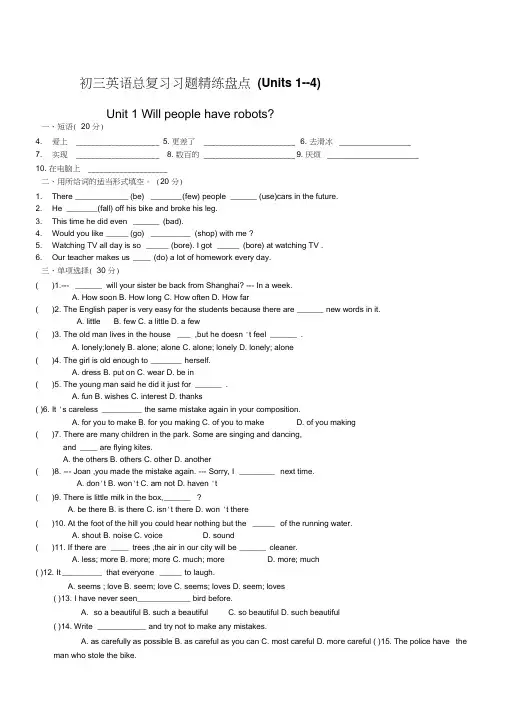
初三英语总复习习题精练盘点(Units 1--4)Unit 1 Will people have robots?一、短语( 20 分)4. 爱上 _____________________5. 更差了 _______________________6. 去滑冰__________________7. 实现 _____________________ 8. 数百的 _______________________ 9. 厌烦_______________________10. 在电脑上 ____________________二、用所给词的适当形式填空。
(20 分)1. There ____________ (be) _______ (few) people ______ (use)cars in the future.2. He _______ (fall) off his bike and broke his leg.3. This time he did even ______ (bad).4. Would you like _____ (go) _________ (shop) with me ?5. Watching TV all day is so _____ (bore). I got _____ (bore) at watching TV .6. Our teacher makes us ____ (do) a lot of homework every day.三、单项选择( 30 分)( )1.--- ______ will your sister be back from Shanghai? --- In a week.A. How soonB. How longC. How oftenD. How far( )2. The English paper is very easy for the students because there are ______ new words in it.A. littleB. fewC. a littleD. a few( )3. The old man lives in the house ___ ,but he doesn 't feel ______ .A. lonely;lonelyB. alone; aloneC. alone; lonelyD. lonely; alone( )4. The girl is old enough to _______ herself.A. dressB. put onC. wearD. be in( )5. The young man said he did it just for ______ .A. funB. wishesC. interestD. thanks( )6. It 's careless _________ the same mistake again in your composition.A. for you to makeB. for you makingC. of you to makeD. of you making( )7. There are many children in the park. Some are singing and dancing,and ____ are flying kites.A. the othersB. othersC. otherD. another( )8. --- Joan ,you made the mistake again. --- Sorry, I ________ next time.A. don'tB. won'tC. am notD. haven 't( )9. There is little milk in the box, ______ ?A. be thereB. is thereC. isn't thereD. won 't there( )10. At the foot of the hill you could hear nothing but the _____ of the running water.A. shoutB. noiseC. voiceD. sound( )11. If there are ____ trees ,the air in our city will be ______ cleaner.A. less; moreB. more; moreC. much; moreD. more; much( )12. It _________ that everyone _____ to laugh.A. seems ; loveB. seem; loveC. seems; lovesD. seem; loves( )13. I have never seen ____________ bird before.A. so a beautifulB. such a beautifulC. so beautifulD. such beautiful( )14. Write ___________ and try not to make any mistakes.A. as carefully as possibleB. as careful as you canC. most carefulD. more careful ( )15. The police have theman who stole the bike.A. found out B looked for C. found D. looked at四、书面表达( 30 分)要求:表达清晰流畅,无语法书写错误,书写干净整洁,词数80 左右。
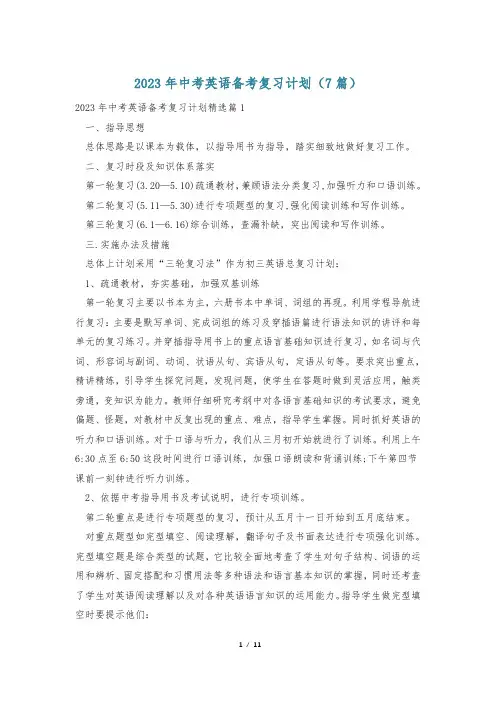
2023年中考英语备考复习计划(7篇)2023年中考英语备考复习计划精选篇1一、指导思想总体思路是以课本为载体,以指导用书为指导,踏实细致地做好复习工作。
二、复习时段及知识体系落实第一轮复习(3.20—5.10)疏通教材,兼顾语法分类复习,加强听力和口语训练。
第二轮复习(5.11—5.30)进行专项题型的复习,强化阅读训练和写作训练。
第三轮复习(6.1—6.16)综合训练,查漏补缺,突出阅读和写作训练。
三.实施办法及措施总体上计划采用“三轮复习法”作为初三英语总复习计划:1、疏通教材,夯实基础,加强双基训练第一轮复习主要以书本为主,六册书本中单词、词组的再现。
利用学程导航进行复习:主要是默写单词、完成词组的练习及穿插语篇进行语法知识的讲评和每单元的复习练习。
并穿插指导用书上的重点语言基础知识进行复习,如名词与代词、形容词与副词、动词、状语从句、宾语从句,定语从句等。
要求突出重点,精讲精练,引导学生探究问题,发现问题,使学生在答题时做到灵活应用,触类旁通,变知识为能力。
教师仔细研究考纲中对各语言基础知识的考试要求,避免偏题、怪题,对教材中反复出现的重点、难点,指导学生掌握。
同时抓好英语的听力和口语训练。
对于口语与听力,我们从三月初开始就进行了训练。
利用上午6:30点至6:50这段时间进行口语训练,加强口语朗读和背诵训练;下午第四节课前一刻钟进行听力训练。
2、依据中考指导用书及考试说明,进行专项训练。
第二轮重点是进行专项题型的复习,预计从五月十一日开始到五月底结束。
对重点题型如完型填空、阅读理解,翻译句子及书面表达进行专项强化训练。
完型填空题是综合类型的试题,它比较全面地考查了学生对句子结构、词语的运用和辨析、固定搭配和习惯用法等多种语法和语言基本知识的掌握,同时还考查了学生对英语阅读理解以及对各种英语语言知识的运用能力。
指导学生做完型填空时要提示他们:1)通读全文,从整体上感知全文,掌握大意,切忌只盯住一个句子仓促解题。
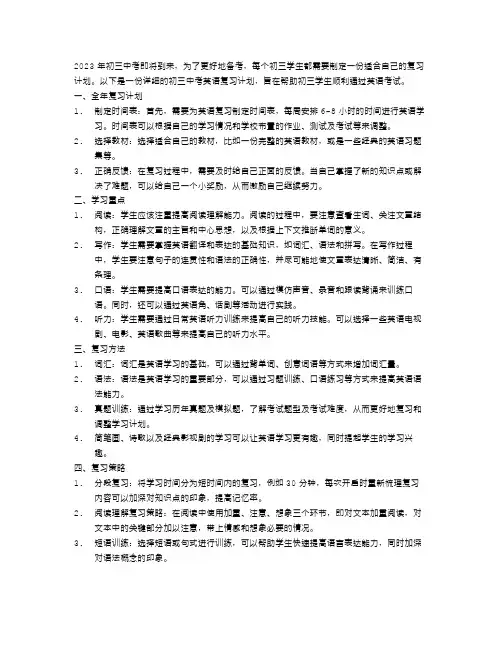
2023年初三中考即将到来,为了更好地备考,每个初三学生都需要制定一份适合自己的复习计划。
以下是一份详细的初三中考英语复习计划,旨在帮助初三学生顺利通过英语考试。
一、全年复习计划1.制定时间表:首先,需要为英语复习制定时间表,每周安排6-8小时的时间进行英语学习。
时间表可以根据自己的学习情况和学校布置的作业、测试及考试等来调整。
2.选择教材:选择适合自己的教材,比如一份完整的英语教材,或是一些经典的英语习题集等。
3.正确反馈:在复习过程中,需要及时给自己正面的反馈。
当自己掌握了新的知识点或解决了难题,可以给自己一个小奖励,从而激励自己继续努力。
二、学习重点1.阅读:学生应该注重提高阅读理解能力。
阅读的过程中,要注意查看生词、关注文章结构,正确理解文章的主旨和中心思想,以及根据上下文推断单词的意义。
2.写作:学生需要掌握英语翻译和表达的基础知识,如词汇、语法和拼写。
在写作过程中,学生要注意句子的连贯性和语法的正确性,并尽可能地使文章表达清晰、简洁、有条理。
3.口语:学生需要提高口语表达的能力。
可以通过模仿声音、录音和跟读背诵来训练口语。
同时,还可以通过英语角、话剧等活动进行实践。
4.听力:学生需要通过日常英语听力训练来提高自己的听力技能。
可以选择一些英语电视剧、电影、英语歌曲等来提高自己的听力水平。
三、复习方法1.词汇:词汇是英语学习的基础,可以通过背单词、创意词语等方式来增加词汇量。
2.语法:语法是英语学习的重要部分,可以通过习题训练、口语练习等方式来提高英语语法能力。
3.真题训练:通过学习历年真题及模拟题,了解考试题型及考试难度,从而更好地复习和调整学习计划。
4.简笔画、诗歌以及经典影视剧的学习可以让英语学习更有趣,同时提起学生的学习兴趣。
四、复习策略1.分段复习:将学习时间分为短时间内的复习,例如30分钟,每次开启时重新梳理复习内容可以加深对知识点的印象,提高记忆率。
2.阅读理解复习策略:在阅读中使用加重、注意、想象三个环节,即对文本加重阅读,对文本中的关键部分加以注意,带上情感和想象必要的情况。
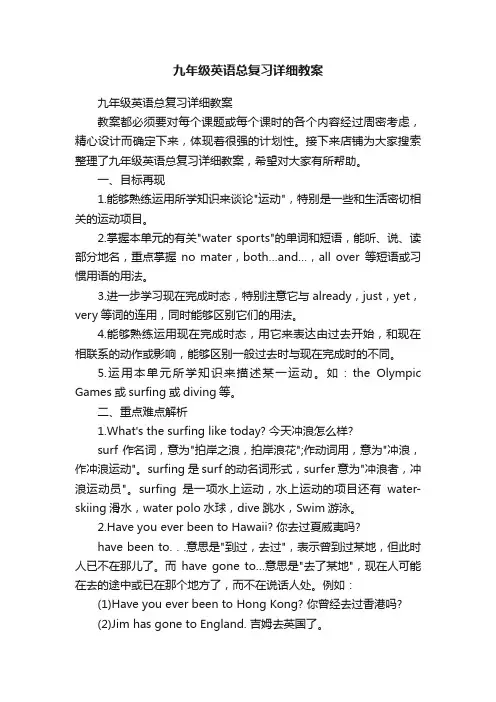
九年级英语总复习详细教案九年级英语总复习详细教案教案都必须要对每个课题或每个课时的各个内容经过周密考虑,精心设计而确定下来,体现着很强的计划性。
接下来店铺为大家搜索整理了九年级英语总复习详细教案,希望对大家有所帮助。
一、目标再现1.能够熟练运用所学知识来谈论"运动",特别是一些和生活密切相关的运动项目。
2.掌握本单元的有关"water sports"的单词和短语,能听、说、读部分地名,重点掌握no mater,both…and…,all over等短语或习惯用语的用法。
3.进一步学习现在完成时态,特别注意它与already,just,yet,very等词的连用,同时能够区别它们的用法。
4.能够熟练运用现在完成时态,用它来表达由过去开始,和现在相联系的动作或影响,能够区别一般过去时与现在完成时的不同。
5.运用本单元所学知识来描述某一运动。
如:the Olympic Games或surfing或diving等。
二、重点难点解析1.What's the surfing like today? 今天冲浪怎么样?surf作名词,意为"拍岸之浪,拍岸浪花";作动词用,意为"冲浪,作冲浪运动"。
surfing是surf的动名词形式,surfer意为"冲浪者,冲浪运动员"。
surfing是一项水上运动,水上运动的项目还有water-skiing滑水,water polo水球,dive跳水,Swim游泳。
2.Have you ever been to Hawaii? 你去过夏威夷吗?have been to. . .意思是"到过,去过",表示曾到过某地,但此时人已不在那儿了。
而have gone to…意思是"去了某地",现在人可能在去的途中或已在那个地方了,而不在说话人处。
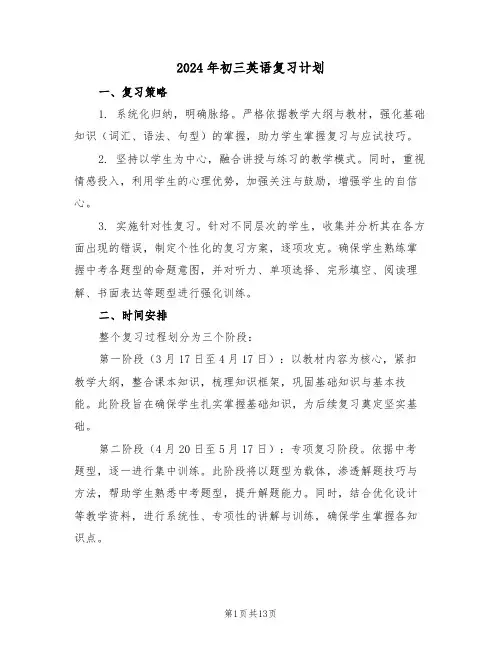
2024年初三英语复习计划一、复习策略1. 系统化归纳,明确脉络。
严格依据教学大纲与教材,强化基础知识(词汇、语法、句型)的掌握,助力学生掌握复习与应试技巧。
2. 坚持以学生为中心,融合讲授与练习的教学模式。
同时,重视情感投入,利用学生的心理优势,加强关注与鼓励,增强学生的自信心。
3. 实施针对性复习。
针对不同层次的学生,收集并分析其在各方面出现的错误,制定个性化的复习方案,逐项攻克。
确保学生熟练掌握中考各题型的命题意图,并对听力、单项选择、完形填空、阅读理解、书面表达等题型进行强化训练。
二、时间安排整个复习过程划分为三个阶段:第一阶段(3月17日至4月17日):以教材内容为核心,紧扣教学大纲,整合课本知识,梳理知识框架,巩固基础知识与基本技能。
此阶段旨在确保学生扎实掌握基础知识,为后续复习奠定坚实基础。
第二阶段(4月20日至5月17日):专项复习阶段。
依据中考题型,逐一进行集中训练。
此阶段将以题型为载体,渗透解题技巧与方法,帮助学生熟悉中考题型,提升解题能力。
同时,结合优化设计等教学资料,进行系统性、专项性的讲解与训练,确保学生掌握各知识点。
第三阶段(5月20日至6月16日):模拟考试阶段。
通过综合模拟训练,把握中考脉络,合理安排答题时间。
此阶段旨在培养学生的审题与解题能力,提升应试技巧。
通过模拟测试,检验学生的复习成果,为中考做好充分准备。
中考复习任务艰巨,时间紧迫。
每位教师应根据自身教学进度及学生实际情况,制定科学合理的复习计划,并严格要求学生书写规范化,注重培优补差。
通过扎实有效的复习工作,助力学生在中考中取得优异成绩,圆满完成初中英语学习任务。
2024年初三英语复习计划(二)一、复习流程概述我们将对每个单元的核心词汇与句型进行详尽的串联讲解与阐述,旨在帮助学生构建坚实的知识体系。
随后,针对教学大纲所强调的重点、难点以及学生在日常练习中所暴露出的薄弱环节,我们将进一步细化与分解,确保复习内容全面覆盖,不留任何遗漏之处。
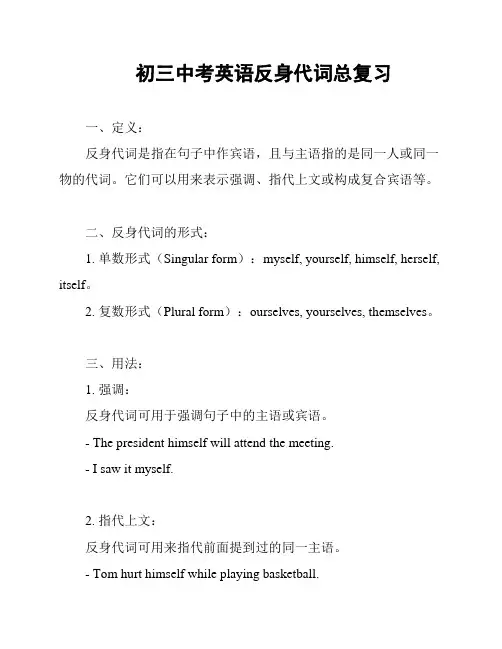
初三中考英语反身代词总复习一、定义:反身代词是指在句子中作宾语,且与主语指的是同一人或同一物的代词。
它们可以用来表示强调、指代上文或构成复合宾语等。
二、反身代词的形式:1. 单数形式(Singular form):myself, yourself, himself, herself, itself。
2. 复数形式(Plural form):ourselves, yourselves, themselves。
三、用法:1. 强调:反身代词可用于强调句子中的主语或宾语。
- The president himself will attend the meeting.- I saw it myself.2. 指代上文:反身代词可用来指代前面提到过的同一主语。
- Tom hurt himself while playing basketball.3. 构成复合宾语:当动词后面有宾语时,反身代词可以作为宾语的一部分出现。
- She always keeps herself busy.4. 惯用法:- enjoy oneself:玩得开心;enjoy yourselves:玩得开心(对多人说)- help oneself to:随便吃喝- by oneself:独自一个人四、注意事项:1. 反身代词一般不用于句子的主语位置。
2. 在句子中,反身代词不可与物主代词同时出现。
五、练题:选择正确的答案填空。
1. She hurt _______ while she was cooking.A. herselfB. myselfC. yourself2. We can take care of _______.A. ourselvesB. herselfC. myself3. Tina, help _______ to some snacks.A. yourselvesB. yourselfC. ourselves六、总结:反身代词是英语中一种重要的语法现象,它们在句子中的使用有特定的规则和惯用法。
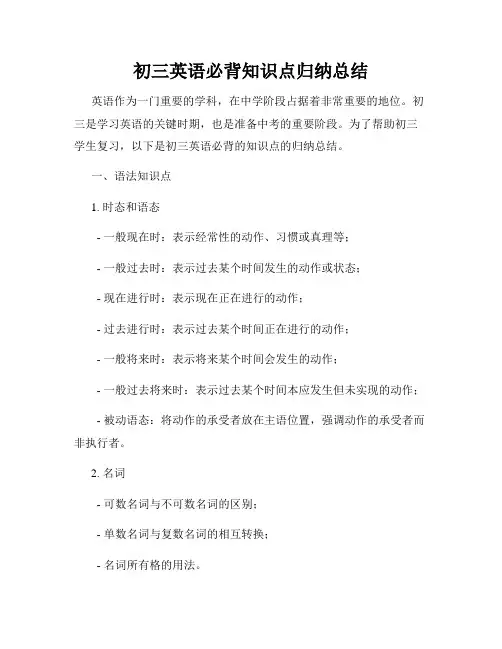
初三英语必背知识点归纳总结英语作为一门重要的学科,在中学阶段占据着非常重要的地位。
初三是学习英语的关键时期,也是准备中考的重要阶段。
为了帮助初三学生复习,以下是初三英语必背的知识点的归纳总结。
一、语法知识点1. 时态和语态- 一般现在时:表示经常性的动作、习惯或真理等;- 一般过去时:表示过去某个时间发生的动作或状态;- 现在进行时:表示现在正在进行的动作;- 过去进行时:表示过去某个时间正在进行的动作;- 一般将来时:表示将来某个时间会发生的动作;- 一般过去将来时:表示过去某个时间本应发生但未实现的动作;- 被动语态:将动作的承受者放在主语位置,强调动作的承受者而非执行者。
2. 名词- 可数名词与不可数名词的区别;- 单数名词与复数名词的相互转换;- 名词所有格的用法。
3. 代词- 人称代词、物主代词、反身代词的用法;- 指示代词和疑问代词的用法。
4. 形容词和副词- 形容词和副词的基本用法;- 比较级和最高级的构成方式;- 不规则比较级和最高级的形式;- 形容词和副词的修饰范围。
5. 介词和介词短语- 常见的介词及其用法;- 介词短语在句子中的作用。
6. 动词- 不同类型动词的用法,包括实义动词、系动词、情态动词等; - 动词的时态和语态。
7. 数词和量词- 基数词和序数词的用法;- 量词的用法。
8. 并列连词和从属连词- 并列连词的分类和用法;- 从属连词的分类和用法。
9. 特殊句型- 倒装句的形式和用法;- 感叹句的形式和用法;- 条件句和虚拟语气的用法;- 宾语从句和主语从句的用法;- 直接引语和间接引语的转换。
二、词汇知识点1. 同义词和反义词- 同义词:指意义相同或相近的词语;- 反义词:指意义相反的词语。
2. 高频词汇- 常见的高频词汇,包括常用动词、形容词、副词、名词等; - 常用短语和固定搭配。
三、阅读技巧1. 阅读理解题- 不同类型的阅读题目,包括事实细节、主旨大意、推理判断等; - 阅读题目的解题技巧和答题方法。
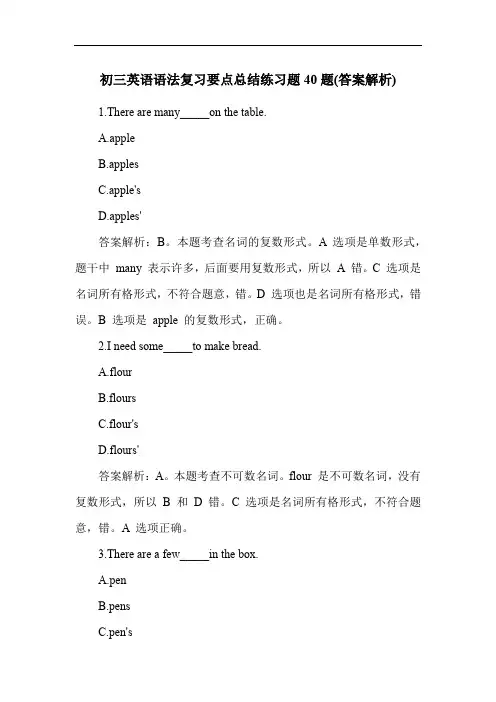
初三英语语法复习要点总结练习题40题(答案解析)1.There are many_____on the table.A.appleB.applesC.apple'sD.apples'答案解析:B。
本题考查名词的复数形式。
A 选项是单数形式,题干中many 表示许多,后面要用复数形式,所以A 错。
C 选项是名词所有格形式,不符合题意,错。
D 选项也是名词所有格形式,错误。
B 选项是apple 的复数形式,正确。
2.I need some_____to make bread.A.flourB.floursC.flour'sD.flours'答案解析:A。
本题考查不可数名词。
flour 是不可数名词,没有复数形式,所以 B 和 D 错。
C 选项是名词所有格形式,不符合题意,错。
A 选项正确。
3.There are a few_____in the box.A.penB.pensC.pen'sD.pens'答案解析:B。
本题考查名词的复数形式。
A 选项是单数形式,题干中a few 表示一些,后面要用复数形式,所以 A 错。
C 选项是名词所有格形式,不符合题意,错。
D 选项也是名词所有格形式,错误。
B 选项是pen 的复数形式,正确。
4.We can see a lot of_____in the park.A.peopleB.peoplesC.people'sD.peoples'答案解析:A。
本题考查集合名词。
people 表示“人,人们”时是集合名词,本身就是复数形式,没有peoples 这种说法,C 和D 选项是名词所有格形式,不符合题意,错。
A 选项正确。
5.I have two_____.A.bookB.booksC.book'sD.books'答案解析:B。
本题考查名词的复数形式。
A 选项是单数形式,题干中two 表示两个,后面要用复数形式,所以A 错。
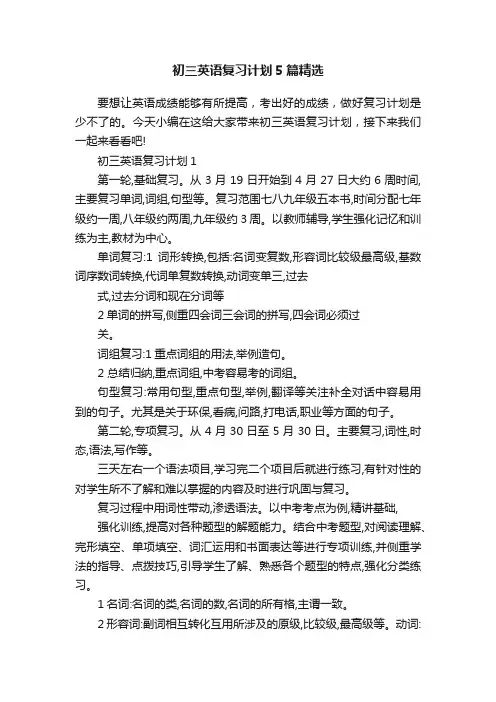
初三英语复习计划5篇精选要想让英语成绩能够有所提高,考出好的成绩,做好复习计划是少不了的。
今天小编在这给大家带来初三英语复习计划,接下来我们一起来看看吧!初三英语复习计划1第一轮,基础复习。
从3月19日开始到4月27日大约6周时间,主要复习单词,词组,句型等。
复习范围七八九年级五本书,时间分配七年级约一周,八年级约两周,九年级约3周。
以教师辅导,学生强化记忆和训练为主,教材为中心。
单词复习:1词形转换,包括:名词变复数,形容词比较级最高级,基数词序数词转换,代词单复数转换,动词变单三,过去式,过去分词和现在分词等2单词的拼写,侧重四会词三会词的拼写,四会词必须过关。
词组复习:1重点词组的用法,举例造句。
2 总结归纳,重点词组,中考容易考的词组。
句型复习:常用句型,重点句型,举例,翻译等关注补全对话中容易用到的句子。
尤其是关于环保,看病,问路,打电话,职业等方面的句子。
第二轮,专项复习。
从4月30日至5月30日。
主要复习,词性,时态,语法,写作等。
三天左右一个语法项目,学习完二个项目后就进行练习,有针对性的对学生所不了解和难以掌握的内容及时进行巩固与复习。
复习过程中用词性带动,渗透语法。
以中考考点为例,精讲基础,强化训练,提高对各种题型的解题能力。
结合中考题型,对阅读理解、完形填空、单项填空、词汇运用和书面表达等进行专项训练,并侧重学法的指导、点拨技巧,引导学生了解、熟悉各个题型的特点,强化分类练习。
1名词:名词的类,名词的数,名词的所有格,主谓一致。
2形容词:副词相互转化互用所涉及的原级,比较级,最高级等。
动词:分类,时态,语态,动词不定式,以及动词的固定搭配,情态动词及其句型。
3代词:主格,宾格,物主代词,反身代词,疑问代词,副词和不定代词相互转化及其运用。
4还有介词,句式,主谓一致,定语从句,宾语从句,进一步系统时态语态及其各类句式的归类运用。
第三轮复习综合复习从6月4日至考前这一阶段主要以综合测试为主。
九年级英语复习计划(5篇)(经典版)编制人:__________________审核人:__________________审批人:__________________编制单位:__________________编制时间:____年____月____日序言下载提示:该文档是本店铺精心编制而成的,希望大家下载后,能够帮助大家解决实际问题。
文档下载后可定制修改,请根据实际需要进行调整和使用,谢谢!并且,本店铺为大家提供各种类型的经典范文,如总结报告、心得体会、策划方案、合同协议、条据文书、竞聘演讲、心得体会、教学资料、作文大全、其他范文等等,想了解不同范文格式和写法,敬请关注!Download tips: This document is carefully compiled by this editor. I hope that after you download it, it can help you solve practical problems. The document can be customized and modified after downloading, please adjust and use it according to actual needs, thank you!Moreover, our store provides various types of classic sample essays, such as summary reports, insights, planning plans, contract agreements, documentary evidence, competitive speeches, insights, teaching materials, complete essays, and other sample essays. If you want to learn about different sample formats and writing methods, please stay tuned!九年级英语复习计划(5篇)如何进行有效的复习,大家都有接触过复习计划吧,在复习时,学习的范畴不能拘泥于原有的知识,而应该有所拓展。
初三英语短语总复习1. prepare for为……作准备2. make a mess弄得一团糟3. keep one’s cool 沉住气;保持冷静4. go by时间逝去;过去5. believe in信任;信赖6. be thirsty for渴望;渴求7. be thankful to sb对某人心存感激8. ahead of=in front of在……前面9. be responsible for对……有责任;负责任10. separate from分离;隔开11. It is said that...据说12. It is believed that....据认为13. translate...into...把...翻译成....14. break the rule违规15. stay by one’s side呆在某人身边16. wear a suit and tie穿西装戴领带17. prefer A to B 比起B来,更喜欢A18. prefer doing A to doing B 比起做B来,更喜欢做A19. not much=nothing much没什么20. five minutes late 迟到5分钟21. five minutes later 5分钟后22. value the time 珍惜时间23. table manners餐桌礼仪24. be different from与..不同25. learn from mistakes从错误中学习26. nod in agreement点头同意27. think to oneself心里暗想28. What bad luck!多倒霉啊!29. stay up late 熬夜30. hundreds of数百的31. thousands of成千上万的32. at first=to start with=first of all起初,首先33. at the end of..在....末34. by the end of..在...结束之前35. offer to do sth. 主动提出做某事36. be used for doing sth.被用来做某事37. agree to do sth.同意做某事38. be able to do sth.能够做某事39. mean doing sth.意味着做某事40. need to do sth.需要做某事41. It takes sb. some time to do sth.42. put off doing sth. 推迟做某事43. want sb.to do sth.=would like to do sth. 做某事花某人时间44. be/become interested in doing sth. 想某人做某事45. find+ it +adj. + to do sth.看见某人正在做某事46. expect sb. to do sth.期待某人做某事47. see sb. doing sth. be expected to do sth.被期待做某事48. hope to do sth.希望做某事49. be supposed to do sth.应该做某事50. feel free to do sth. 可以随便做某事51. hear sb. doing sth.52. advise sb. to do sth.建议某人做某事53. be afraid to do sth.害怕做某事听见某人正在做某事54. encourage sb.to do sth.鼓励某人做某事55. teach sb. to do sth.教某人做某事56. finish doing sth. 完成做某事57. seem to do sth.似乎做某事58. plan to do sth.=make plans to do sth. 计划做某事59. be busy doing sth. 忙于做某事60. be excited to do sth.兴奋做某事61. give up doing sth.放弃做某事62. ask sb.not to do sth.叫某人不做某事63. be about to do sth.正要做某事64. practice doing sth. 练习做某事65. tell sb.not to do sth.66. guide sb. to do sth.指导某人做某事67. succeed in doing sth.成功做成某事68. warn sb. not to do sth.69. consider doing sth.=think about / of70. used to do sth. 过去常做某事警告某人不做某事71. doing sth. 考虑做某事72. be used to do sth.被用来做某事73. dare to do sth.敢于做某事74. look forward to doing sth.盼望做某事75. decide to do sth. 决定做某事76. be ready to do sth.77. pay attention to doing sth.注意做某事78. try to do sth. =try one’s best to do =be prepared to do sth.准备做某事79. stop/ prevent sb. from doing sth. sth.=make an effort to do sth.尽力做某事阻止某人做某事80. learn to do sth. 学会做某事81. have problems doing sth.=have trouble82. dream of doing sth.梦想做某事83. allow sb. to do sth. 允许某人做某事84. doing sth.=have difficulty doing sth 做某事有困难85. feel kike doing sth.想做某事86. be allowed to do sth.被允许做某事87. be afraid of doing sth.害怕做某事88. should be allowed to do sth.89. have fun doing sth.开心做某事90. avoid doing sth.避免做某事91. keep on doing sth.=stick to doing sth.92. spend time doing sth.花时间做某事93. refuse to do sth. 拒绝做某事继续,坚持做某事94. end up doing sth. 以做某事而告终95. It’s + adj.+ for sb. + to do sth.96. mind sb.doing sth.介意某人做某事97. take up doing sth.开始从事做某事对某人来说, 做某事怎么样98. be/get used to doing sth.习惯于做某事99. be close to doing sth. 差点做成某事100. be worth doing sth.值得做某事1. belong to sb.=be sb.’s属于某人的2. at the picnic在野餐上;野餐时3. the rest of …剩余的/其余的……4. pick up捡起;拾起5. run away跑掉 run after追逐;追赶6. make…feel at home使某人感到宾至如归7. be excited about对…感到兴奋8. show up出现9. drive/make sb. crazy/mad使人发疯/发狂10. have a lot in common有许多共同之处11. leave out忽略;不提及;不包括12. neither…nor…既不…也不…13. take one’s position/place取代某人的位置14. be harmful to=be bad for对……有害15. at the top of在……顶端或顶部16. at the bottom of在.....的底部17. in the past/last few years在过去几年里,与现在完成时连用18. so far到目前为止,与现在完成时连用19. be good for对……有好处20. take part in参加21. eat out在外面吃饭22. turn red变红23. get good grades/scores取得好成绩24. so many/much这么多25. do well in=be good at在...方面做得好26. give a speech=make a speech发言27. according to根据28. fly a kite放风筝29. not only…but also…不但……而且……30. communicate with sb.和某人交流31. point out指出 point at指向32. along with连同...一起,伴随着33. dance to随着...跳舞34. in that case既然那样35. cheer sb.up使某人振奋36. shut off关闭37. in time=once in a while偶尔地,间或38. get married to sb. =marry sb.和某人结婚39. in total总共,合计40. shake hands握手41. for the first time第一次;首次42. as soon as一……就……43. hold out伸出44. to one’s surprise使某人惊讶的是45. on both sides of在…的两边46. drop by顺便拜访;随便进入47. on time准时 in time 及时48. after all毕竟;终归49. get mad大动肝火50. no big deal=not a big deal没什么大事51. clean…off把……擦掉52. clean up清洁,打扫53. take off脱下衣服;飞机起飞54. go out of one’s way特地;格外努力55. search for=look for搜寻,寻找56. let sb.down=disappoint sb.使某人失望57. kick sb off开除某人58. knock on/at敲击59. rather than=instead of而不是60. pull together齐心协力;通力合作61. agree with sb同意某人的意见,观点62. put pressure on sb.给某人施加压力63. be full of充满…64. by the time在…以前65. be late for class上课迟到66. go off闹钟响起67. give…a lift捎……一程68. stare at盯着看;凝视69. wait in line排队等候70. stay up熬夜71. sell out卖光72. lose weight减肥73. run out of=use up用光74. write to sb.给某人写信75. play a part in参与……76. cut down减少77. cut off切断78. cut up切碎79. make a difference起作用;有影响80. lead to导致;通向某地81. hear of=hear about听说82. throw away扔掉83. turn off关掉84. turn on打开85. pay for付费;付出代价86. take action采取行动87. put sth to good use好好利用某物88. pull down拆下;摧毁89. upside down上下颠倒;倒转90. set up建立;开办91. set out出发,启程92. bring back恢复;使想起;归还93. win a prize获奖94. score goals进球95. in a row连续几次地96. take/have a break/rest休息97. be patient with对……有耐心98. no matter how无论怎样99. put in effort=make an effort付出努力100. look back at回首往事;回忆;回顾1. work with sb.与某人一起学习2. make word cards制作单词卡片3. listen to tapes听录音带4. ask sb. for help向某人求助5. watch videos看录像6. have conversations with sb.=talk with sb. 和某人谈话7. too…to太…而不能8. fall in love with爱上…9. as well也10. look up在字典上查阅;抬头看11. so that以便;为了12. so...that.....=such...that...如此..以致...13. take notes记笔记14. spoken English英语口语15. make mistakes in在…方面犯错16. depend on取决于17. pay attention to注意;关注18. connect…with把…和…连接/联系起来19. get bored感到厌倦20. be stressed out感到焦虑不安21. each time=every time每次;每当22. a little有点;一点, 修饰不可数23. a few 一些,几个,修饰可数24. put on增加体重,发胖;穿上25. in two weeks两周后,用在将来时26. sound like听起来像,后接名词27. each other相互;彼此28. in the shape of呈…的形状29. on the Mid-autumn night在中秋之夜30. shoot down射下31. call out叫喊;大声说出32. call in 召来,叫来33. lay out摆开;布置34. dress up as打扮成35. get dressed穿衣服36. think of认为,想起37. think back to回想起38. think about考虑39. play a trick/joke on sb.=play tricks/jokes on sb.开某人的玩笑40. make money挣钱41. remind sb. of sth.使某人想起某事42. wake up醒来43. wake sb. up叫醒某人44. at the beginning of… 在…的开始45. give out=hand out发放;分发46. a pair of一对;一双47. get to=arrive at/in到达48. on one’s left/right在某人的左/右边49. turn left/right向左/右转50. between…and…在…和…之间51. go past=pass by经过;路过52. come on来吧,加油53. on one’s way to在某人去…的路上54. pardon me抱歉;对不起;请再说一遍55. from time to time时常;有时56. such a great idea如此好的一个主意57. take up sth.开始从事某事58. deal with应对;处理59. not…anymore=no longer=no more不再60. all the time总是,一直61. get tons of attention得到大量的关注62. fight on继续奋斗63. a number of大量,许多,后接可数名词64. a lot of=lots of=plenty of大量,许多,后接可数或不可数名词65. at least至少66. in public公开地;在公众面前67. on the soccer team在足球队里68. be absent from classes逃课69. send…to…把…送到…70. send for派人去请71. send out发出,发送72. make friends with sb.与某人交朋友73. be friends with sb.成为某人的朋友74. in person亲身;亲自75. even though=even if尽管;即使;纵然76. take pride in=be proud of为…感到自豪77. be made of/from由…制造/制作材料78. be made in在…制造/制作地点79. be made into被制成成品80. be made by被....制作人81. be famous for以……而著名82. be known for以…闻名;为人知晓83. as far as I know据我所知84. pick by hand手工采摘85. all over the world=around the world全世界86. no matter不论;无论87. everyday things=daily things日用品88. find out查明;弄清89. go on a vacation=take vacation去度假90. paper cutting剪纸91. such as=for example例如92. turn…into…变成…93. be covered with被…覆盖94. rise into上升到;升入95. have a point有道理96. at that time在那时97. by accident偶然;意外地98. by mistake错误地;无意中99. fall into=drop into落入;掉入100. make tea制茶101. less than少于102. more than多于103. take place发生;出现104. without doubt毫无疑问;的确105. in disbelief怀疑;难以置信地106. at a low price以低价107. all of a sudden突然;猛地108. work on从事与;致力于109. work out解决110. be similar to与…类似111. in the end=at last最后112. divide…into…把……分开……113. at the same time同时114. the number of… …的数量115. look up to钦佩;仰慕116. come up with=think out想出117. driver’s license驾照118. No way!没门!119. be worried about=worry about担心120. get one’s ears pierced打耳洞121. take photos/pictures拍照;照相122. make sure确信,确保123. keep sb. away from sth.使某人远离某物124. keep away from sth.远离某物125. hurt oneself伤到某人自己126. give sb. a hug拥抱某人127. life up举起128. talk back回嘴;顶嘴129. make one’s own d ecision自己做决定130. give sb. chances to do sth.给某人机会做某事131. move out搬出来132. be strict with sb.=be hard on sb. 对某人要求严格 133. get in the way of挡…的路;妨碍134. have nothing against不反对135. be serious about对…认真136. spend time/money on sth.137. 在某事上花时间/钱138. spend time/money in doing sth. 花时间/钱做某事 139. suggest doing sth.建议做某事140. miss doing sth.错过做某事141. let sb. do sth. 让某人做某事142. make sb. do sth. 使某人做某事143. see sb. do sth. 看见某人做某事整过程144. hear sb. do sth. 听见某人做某事整过程145. would rather do sth.情愿做某事146. would rathr do A. than do B. 宁愿做A而不愿做B147. remember to do sth记得做某事 148. remember doing sth记得做过某事 149. forget to do sth忘记做某事150. forget doing sth忘记做过某事 151. stop to do sth停下来去做某事 152. stop doing sth停止做某事153. regret to do sth.后悔做某事154. regret doing sth.后悔做过某事看过的人还:感谢您的阅读,祝您生活愉快。
初三的英语总复习计划初三的英语总复习计划(通用6篇)复习应根据自己的实际情况,通过复习,使学生对知识有一个明确的、系统的了解,制订学习计划非常重要。
那么优秀的复习计划是什么样的呢?下面是店铺精心整理的初三的英语总复习计划(通用6篇),仅供参考,大家一起来看看吧。
初三的英语总复习计划篇1第一阶段课本知识扫描。
这个阶段按单元进行全面复习。
但要突出和解决重点和难点。
由于暑期补课时已经复习过七年级上下册以及八年级上册书,因此,本次复习,我将重点放在了八年级下册和九年级课本上。
我们计划按单元复习。
每个单元的单词,词组,和语法都要细细的过。
学生记单词,词组,领会语法,然后做相应的练习题巩固。
最后结合《英语周报》上的综合练习题。
从七年级上册开始一页一页的过。
从而过滤出学生不会做的练习题。
加以引导和解释。
两个班中已经有相当一部分学生掉队。
争取他们的进步是本次复习成功的关键。
我计划:108列出35名学生必须一起走。
109列出30名。
这些学生的作业一样。
必须做,人人过。
要自觉主动接受检查。
这些中108列出20名重点,109列出15名重点。
学习效果主要看这些学生的进步。
学习效果主要看30—35名和26至30名。
(找他们谈心,鼓劲)剩下两个班各有20名学生跟不上课的。
五个为一组,选出组长负责。
每天的任务和其他不一样。
基本是大家任务的三分之一。
必须过。
不会的查书,讨论,询问同学。
想办法解决、看进步、不写作文。
第二阶段是语法专项复习。
按照名词,代词,形容词等等词性以及简单句并列句,复合句等方面,从语法的角度对英语知识进行回顾复习。
使学生对英语知识的了解有更深刻的认识。
在这一阶段,首先通过学生自学《全能中考复习法》书中的典型例题和分析,了解中考的重点动向。
然后做题考查自己对这一块知识的了解。
最后结合《英语周报》的专项语法练习题考查,达到全面了解每个知识点的目的。
在这一阶段,检查和抽查还是非常必要的,毕竟学生的自控能力很差,每天的作业又非常多,不能含糊。
2024年初三英语总复习大纲一、语法复习1. 时态:一般现在时、一般过去时、一般将来时、现在进行时、过去进行时、过去将来时、过去完成时、现在完成时等。
2. 名词:可数名词、不可数名词、复数形式等。
3. 冠词:定冠词、不定冠词、零冠词等。
4. 代词:人称代词、物主代词、反身代词、指示代词、不定代词等。
5. 动词:及物动词、不及物动词、动词的时态、语态等。
6. 形容词和副词:形容词的比较级和最高级、副词的比较级和最高级等。
7. 连词:并列连词、从属连词等。
8. 介词:表示时间、地点、方式等的介词。
9. 句子结构:陈述句、疑问句、祈使句、感叹句等。
10. 直接引语和间接引语。
二、词汇复习1. 高频词汇复习,包括常用名词、动词、形容词、副词等。
2. 词组和固定搭配的复习,如常用的短语动词、习惯搭配等。
三、阅读理解复习1. 阅读理解题型的分析和解题技巧。
2. 不同类型文章的阅读技巧,如记叙文、说明文、议论文等。
3. 阅读理解中常见的词汇和句型。
四、写作复习1. 书信写作:如求职信、道歉信、感谢信等。
2. 日记和文章写作:如描述人物、事件、景物等。
3. 图表写作:如图表描述和数据分析。
五、听力复习1. 听力题型的分析和解题技巧。
2. 听力材料中常见的词汇和句型。
六、口语复习1. 日常生活中常用的口语表达。
2. 各种情境下的口语交际技巧。
七、翻译复习1. 中英互译的常用表达。
2. 句子翻译和段落翻译的技巧。
以上为2024年初三英语总复习大纲,根据各个考点和题型进行系统复习,重点掌握语法、词汇、阅读理解、写作、听力、口语和翻译等方面的知识和技巧,以提高英语综合应用能力。
初三的英语语法知识点总结归纳英语作为一门重要的学科,语法是其基础和核心内容。
在初三阶段,学生需要全面掌握英语语法知识,以便正确运用语言表达自己的思想和理解他人的意思。
本文将对初三英语语法知识点进行总结归纳,帮助同学们快速复习和强化记忆。
一、词类与词性1. 名词(Noun):表示人、物、地点、抽象概念等。
2. 代词(Pronoun):代替名词,分为人称代词、物主代词、反身代词等。
3. 形容词(Adjective):修饰名词或代词,描述属性或特征。
4. 副词(Adverb):修饰动词、形容词和其他副词,表示程度、方式、时间等。
5. 动词(Verb):表示动作、状态或存在。
6. 介词(Preposition):表示位置、方向、时间、关系等。
7. 连词(Conjunction):连接词语、短语、从句等。
8. 冠词(Article):限定名词的用法,分为不定冠词(a/an)和定冠词(the)。
二、句子结构与语法规则1. 陈述句(Declarative Sentence):陈述一个事实或观点,语序为主语+谓语+宾语/补语。
2. 疑问句(Interrogative Sentence):用于提问,语序为助动词/特殊疑问词+主语+谓语+宾语/补语。
3. 祈使句(Imperative Sentence):表达命令、请求、建议等,语序为谓语+宾语/补语。
4. 感叹句(Exclamatory Sentence):表达强烈的感情或意见,语序为"What/how+adj./adv.!"。
5. 主谓一致:主语与谓语之间在人称、数上保持一致。
6. 定语从句(Adjective Clause):用来修饰名词或代词的从句,引导词有关系代词和关系副词。
7. 状语从句(Adverbial Clause):修饰动词、形容词和副词的从句,包括时间、地点、条件、原因等。
三、时态与语态1. 一般现在时(Simple Present):表示经常性、习惯性或普遍真理,动词原形。
(完整word版)九年级英语期末总复习(初三人教版)九年级英语期末总复短语回顾Unit 111.would rather (not )do sth宁愿(不)做某事2.drive sb。
crazy / mad使某人发疯、发狂3.the more … the more …越。
越。
4.be friends with sb.和某人成为朋友make XXX和某人交朋友5.leave out忽略,不提及6.call in召来7.XXX … XXX…既不。
也不。
8.to start with = to begin with首先,起初9.start with=begin with以。
开始10.XXX让某人失望11.kick sb。
off开除某人12.be hard on sb.对某人要求严厉be XXX对某人要求严格13.rather than = instead of而不是14.XXX15.arrive XXX迟到16.ask sb。
not to do sth.叫某人别做某事17.be XXX …担心。
XXX …18.follow by追随19.be in agreement with sb.赞成或人20.nothing wrong with sb或人没弊端21.take one’s position替代或人的位置=take one’s place22.in three days’time三天时间后= in three daysUnit 10.1.drop by =drop in on顺便拜访2.after all毕竟3.get mad with sb.对某人生气XXX对某物生气4.make an XXX.做出努力做某事5.clean… off把。
擦掉6.XXX off脱下,腾飞7.go out of one’s way to do XXX分外勉力做某事8.make … feel at home使。
感触宾至如归9.get / be used to doing sth气于做某事10.shake hands with sb.和或人握手11.meet sb。
初三英语总复习重点短语:1.Too … to =so … that 太而不能2.invent sb to +地点邀请某人去某地 invent sb to do sth 邀请某人干某事3.call sb=ring sb up 给某人打电话4.Thanks for doing sth =Thank you for doing sth 为某事而感谢某人5基数词+more+名词= another +基数词+名词又…,再…6.stop doing sth 停止做某事 stop to do sth停下来去做某事7remember to do sth记得将要做某事 remember doing sth 记得做过某事 8ask sb to do sth 要求某人干某事 tell sb to sth 告诉某人干某事9 have fun doing =have a good time =enjoy oneself/oneselves 玩的愉快10.make do sth (主动) be made to do sth (被动)让某人干某事Let do sth(主动) be let to do sth被动)让某人干某事11.how about /what about …怎么样(询问情况)12 what else 其他别的 13. would like to do =want to do 想要干某事 14.in order to do sth 为了 15. one of the +adj最+n(复数)16.on weekends 在周末 on weekdays 在工作日17have breakfast/lunch/dinner 吃早饭/午饭/晚饭18.play the guitar 弹吉他 play football踢足球 play the piano 弹钢琴19.how often 多久一次 how long多长时间(for/since+时间)how far 多长 how soon多长时间(in+一段时间)how much多少 How much does it cost?=What′s the price of it?20 be good for 对……有益___反____be bad for对……有害21 get back 回来 think about 思考 decide on 决定22 something different 不同的东西 something else 别的东西23 go hiking去远足 go swimming 去游泳 go +v_ing 去干某事24 plan to do sth 计划干某事 more than = over 超过26 be different from不同于…_____反____the same as与…相同27 keep health 保持健康 look like 看起来像28 one hundred/million/billionSix hundred/million/billion hundreds/millions/billions of29 on a trip to…到…旅行 far from 远离30 by plan /bus/train 乘飞机/公共汽车/火车(介词短语)take a taxi/plan/bus/train乘出租车/飞机/公共汽车/火车(动词短语)31 be mad at 生…的气 be angry with sb be angry at sth32 too +adj+ to 太……以至于不能So+adj +that+从句太……以至于不能33 It takes/willtake/took sb sometime to do sth(人)sb +spend/spent ……(in)doing sth(人)sb +spend/spent …… on sth(物)sth +st 花费时间干某事(人)sb+ pay for 为……付款34 help sth忙于做……帮助某人干某事忙于做……35主句+ as soon as +从句主句 + if(如果) +从句(主将从现)36 It′s +adj+ (for sb )to do sth 干某事是……37 do well in 在某方面干的好 be good at doing sth 擅长干某事38 one …the other 一个…另一个some… others一些…另一些39 half an hour 半小时 one and half an hour 一个半小时40 ten more years =another ten years 再过十年41 be interested in doing sth 对……感兴趣42 how about /what about …? ……怎么样?43 stop …from doing sth /prevent …from doing sth 阻止干…44 agree to do sth. 同意做某事 . agree with sh. 赞同,同意某人的看法45 arrive at (in) a place =get to =reach到达某地46 as…+adj原…as possible 尽可能 as soon as possible尽快地the more…, the more.. 越……,就越……more and more越来越多 the more, the better越多越好、47 help yourself to…… 请随便吃……learn …by oneself 自学48 make friends with 与……交朋友 make a mistake 犯错误49 not only…but also 不但……而且…… (谓语动词就近一致原则)neither… nor既不……也不 (谓语动词就近一致原则)either…or不是……就是 (谓语动词就近一致原则)both…and两者都能 (谓语动词用复数)50. on one’s way to… 在去……的路上51 be known as/be famous as作为……而闻名 be known for因……而出名52 be worth doing值得做……53 take part in参加get back 回来,取回54 turn on打开 turn up (把……音量)turn off关掉 turn down (把……音量)调低55 to one’s surprise让某人感到惊奇的是 in surprise惊奇地56 go on doing继续做 go on to do继续去做(原本未完成的57 used to过去常常. be used to习惯于 be used as被用来做58the number of …… + 谓语(单数)is …的数量a number of + 谓语(复数)are 大量的59 fill...with 充满 be filled with被……充满full of充满 be full of被……充满60 would rather to do… than do与其……不如61 developing countries发展中国家 developed countries发达国家62 three quarters/ three fourths四分之三 eat up 吃光,吃完63 in future/ in the future今后/在未来64 at the age of 12十二岁时65 be afraid to do 不敢,胆怯去做某事,是主观上的原因不去做,意为"怕";be afraid of doing 生怕,恐怕"。
66感官动词 see, watch, observe, notice, look at, hear, listen to, smell,taste, feel + do 表示动作的完整性,真实性;+doing 表示动作的连续性,进行性动词原形""为什么不……?" "干吗不……?"动词原形? 为什么不……?" "干吗不……?68 no longer/more=not…any longer/more 不再69 take(good) care of…=look after…(well) (好好)照顾,照料70 It’s time to do…/ It’s time for sth. 意为“该做……的时间了”,71 What about…doing?/How about doing…?意为“……怎么样?”72 ※So + be/助动词/情牵动词/主语. “另一人(物)也如此”So do I 我也是前面陈述的否定情况也适于另一人(物)时,常用“Neither + be/助动词/情态动词+主语.※So+主语+be/助动词/情态动词“的确如此。
”“是呀。
”So I do 的确如此。
”“是呀73.S+…think/find + it + adj. + to do sth.74 What’s wrong with…?=What’s the matter/ trouble with…?后跟某物作宾语时,意为“某物出什么毛病了?”后跟某人作宾语时,意为“某人怎么了?”75 I’m sorry to hear that. 意为“听到此事我很难过(遗憾)。
”常用于对别人的不幸表示同情、遗憾之意。
76 used to do sth. 过去常做某事;be/ get used to doing sth. 习惯于做某事;be used to do sth. 被用来做某事。
77 warn sb. of sth. 警告某人某事warn sb. to do sth.告诫某人做某事78 in the morning/ afternoon/ evening/ 表示“在上午/下午/傍晚”等一段时间79 in the wall表示“在墙上”(凹陷进去)”;on the wall表示“在墙上”(指墙的表面)80 in the tree表示“在树上”(非树本身所有)”on the tree表示“在树上”(为树本身所有)”。
81 I think+从句…意为“我认为……”。
其否定式常用I don’t think+从句…,82 be as…原级…as 和什么一样eg : She is as tall as me 她和我一样高83 be made from 由……制成(制成以后看不见原材料)be made of 由……制成(制成以后还看得见原材料)84 be sure of doing sth 对做某事有信心85 because+句子because of +短语eg : He was late because he had a headacheHe was late because of his headache86 between…and… 两者之间87come up with 提出88 catch up with sb 赶上某人89 decide to do sth 决定做某事90all kinds of 各种各样a kind of 一样91 be(feel) afraid to do sth 害怕做某事be afraid of sth/doing sth 害怕某物be afraid that 丛句92 It’s adj/adv+for/of+somebody to do something’某事对某人来说很怎么样(这个要看那个形容词是什么了)93祈使句+and+从句(那么).. .=If you +祈使句,+从句eg.Go straight on and you’ll see a school. =If you go straight on, you’ll see a school.祈使句+or.+.从句.(否则.). .= If you don’t+祈使句,.+.从句.eg.Work hard, or you will fall behind the other students.=If you don’t work hard, you’ll fall behind the other94 What...do with...?=How …deal with?怎样对付...?怎样处理...?95 one of +最高级+复数最...之一96 had better do sth.最好干某事.97 have been to 某人曾去过某地,现在人不在那儿have gone to 某人已去某地,人不在这儿98 .What’s the population of ...? ...人口有多少?99 few\a few\little\a littlefew a few 修饰可数名词little\a little修饰不可数名词a few\a little表肯定,意思是“有几个” few\little表否定,意思是“没几个”100 also\either\too三个单词都是“也”的意思also用于句中either用于否定句末too用于肯定句末101 some time指一些时间sometimes有时sometime指将来某时some times指一些次数102 across指平面穿过,例如穿过马路、through指立体穿过,例如穿过大楼、森林、房间。